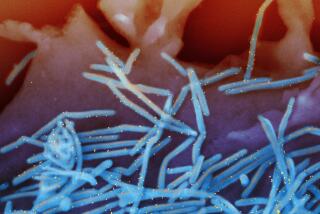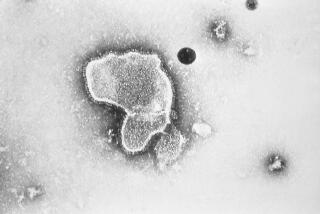Young Girls Could Be in Line for Vaccine to Stop Cervical Cancer
- Share via
BALTIMORE — With conservative opposition softening, scientists say a vaccine that could eliminate most cases of cervical cancer appears headed toward government approval for girls as young as 9.
The Food and Drug Administration is expected to decide next month whether to grant a license to Merck & Co., which hopes to market the vaccine against the human papillomavirus (HPV). The sexually transmitted virus can trigger cervical cancer and genital warts.
If approved, it would become the first vaccine designed specifically to prevent a form of cancer. Because the virus spreads rapidly among teenagers once they become sexually active, proponents argue that it should be offered to preteen girls -- and possibly boys as well.
“I don’t know how you argue against a vaccine that prevents cancer,” Dr. David I. Bernstein, a pediatrician from the Cincinnati Children’s Hospital Medical Center, said after addressing the National Foundation for Infectious Diseases in Baltimore on Tuesday.
The possibility of administering the vaccine to youths had raised concerns among some social conservatives that it could send a message that teen sex is safe and acceptable. But now, many conservative groups, including some on the religious right, say they support FDA approval as long as vaccination is not required for school admission -- a decision typically left to states.
“We’re health professionals,” said Dr. Gene Rudd, a Tennessee obstetrician-gynecologist who is associate director of the Christian Medical and Dental Assns. “Where there are diseases out there, the only reasonable way you can protect individuals and society is to be immunized.”
After a two-year trial involving 12,000 sexually active women in 13 countries, Merck reported last year that the vaccine provided 100% protection against the two strains of the human papillomavirus responsible for 70% of all cervical cancers.
The vaccine probably won’t replace routine Pap smears because it doesn’t fight all strains. Pap smears can detect precancerous cells that can be removed to prevent deadly tumors.
Though Merck has applied for FDA approval, SmithKline Beecham is expected to ask permission later this year to market its own HPV vaccine.
The Merck vaccine targets two strains responsible for cervical cancer and two that trigger genital warts, whereas SmithKline’s targets the cancer strains only.
Although the FDA delighted conservatives when it refused to act on its own advisors’ recommendation to make emergency contraception available without a prescription, most observers say the agency probably will approve the HPV vaccine.
Once the FDA rules on Merck’s application, a group that advises the Centers for Disease Control and Prevention will make specific recommendations about who should be vaccinated.






